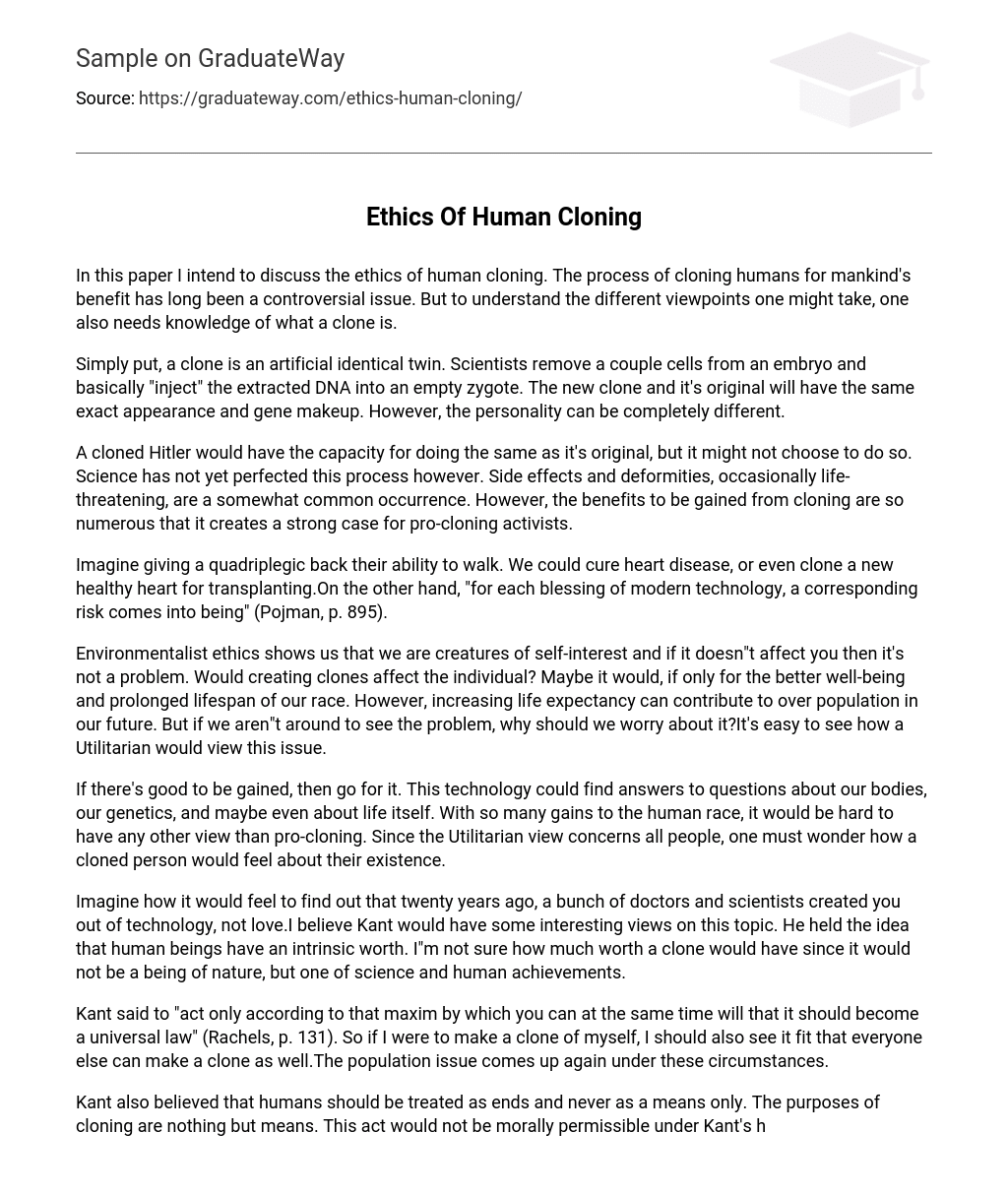The ethical implications of human cloning, a contentious matter for quite some time, are the main subject of this paper. To gain a comprehensive understanding of the various perspectives, it is crucial to initially comprehend the definition of a clone.
In simple terms, a clone is essentially an artificial identical twin. The process involves scientists extracting a few cells from an embryo and then “injecting” the DNA into an empty zygote. As a result, the new clone and its original will possess identical appearance and genetic composition. However, their personalities may greatly differ.
Although a cloned Hitler would be capable of the same actions as the original, it may not necessarily choose to pursue them. Currently, science has not fully perfected this procedure. Side effects and deformities, sometimes posing a threat to life, are quite common during the process. Despite these drawbacks, the vast benefits associated with cloning create a compelling argument for those in favor of it.
It is important to consider the potential for a quadriplegic to regain mobility. We currently have the ability to treat heart disease and create a new, healthy heart for transplantation. However, it is vital to acknowledge that with every technological advancement, there are also accompanying risks (Pojman, p. 895).
From an environmentalist perspective, our understanding of nature is guided by our concept of self-interest. In simpler terms, if something does not directly affect us, we do not see it as a problem. The creation of clones could have positive effects on individuals, potentially enhancing their quality of life and prolonging their lifespan. However, this may also result in future overpopulation due to longer life expectancies. Nevertheless, if we do not personally witness the issue at hand, there may be no reason for worry. It is clear how a Utilitarian viewpoint would address this issue.
If there is potential benefit, then pursue it. This technology holds the potential to address inquiries about our bodies, genetics, and perhaps even life’s mysteries. With numerous advantages for humanity, it is difficult to hold any perspective other than supporting cloning. As the Utilitarian perspective considers all individuals, it raises the question of how a cloned individual would perceive their own existence.
Imagine discovering that two decades ago, a group of physicians and scientists fabricated you using technology instead of the bond of love. In relation to this subject, I find it intriguing to consider Kant’s perspective. Kant maintained that human beings possess an inherent value. However, I am uncertain of the value a clone would possess, as it would not be a being of natural origin but rather a product of scientific advancements.
According to Kant, individuals should only act in a way that they can will to become a universal law. Thus, if I were to create a clone of myself, I would also endorse the idea that everyone else should have the ability to create a clone. Consequently, the population issue resurfaces in such scenarios.
According to Kant, humans must always be treated as ends in themselves and not merely as a means to an end. Since the goals of cloning are solely instrumental, this practice would violate Kant’s principles of human dignity. The potential benefits of human cloning are well-known.
The potential for medical progress is vast, yet so is the potential for complications. Personally, as a Utilitarian, I support it after carefully considering all the factors and consequences. Human cloning research has the potential to reveal unforeseen and remarkable insights into our own existence.
With scientific advancement, we may discover cures for numerous diseases, which could lead to a population problem due to the overall increase in life expectancy and the subsequent strain on the environment. However, this is the only major concern I anticipate. It is crucial for people to grasp that scientific progress is inevitable, and once it commences, we will witness groundbreaking achievements that are beyond our current imagination.





